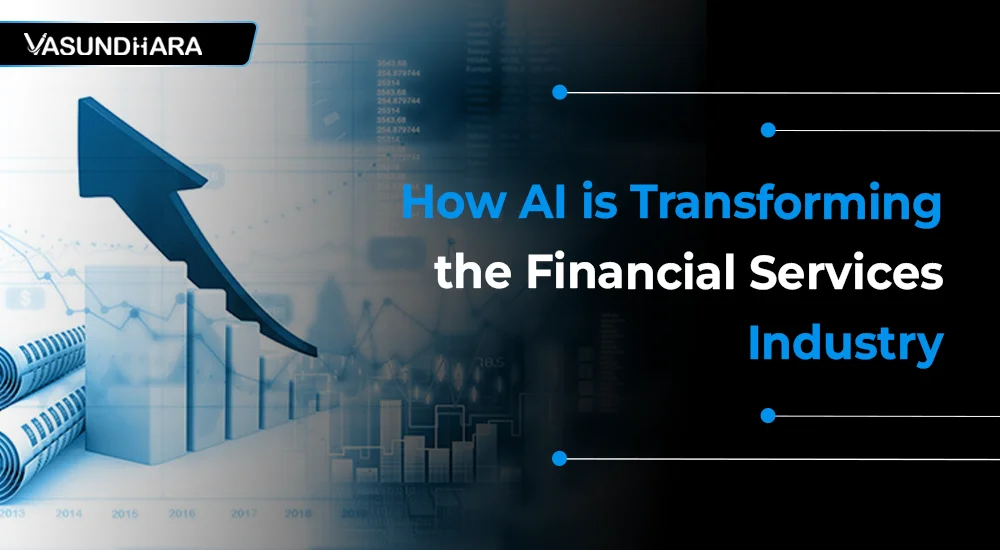In a world where technology evolves at lightning speed, artificial intelligence (AI) stands out as a revolutionary force reshaping industries across the globe. The financial services sector, a cornerstone of the modern economy, is no exception. Imagine a financial landscape where algorithms can predict market shifts with near-psychic accuracy, chatbots provide 24/7 customer service without a hint of fatigue, and fraud detection systems catch deceitful transactions before they occur. This isn't science fiction—it's the present reality shaped by AI.
As the financial world becomes increasingly complex, driven by the digital age’s demands, AI emerges as a key player in redefining how services are delivered and managed. From enhancing efficiency to driving innovation, AI is transforming financial services industry trends in ways that were once the stuff of dreams. This blog explores how AI is revolutionizing the financial services industry, highlighting its applications, benefits, challenges, and future prospects. It showcases how Vasundhara Infotech, a leading financial software development company, is at the forefront of this transformation.
What is Artificial Intelligence?
Artificial Intelligence refers to the simulation of human intelligence in machines programmed to think and learn. Unlike traditional software that follows rigid instructions, AI systems have the capability to adapt and improve their performance through learning from data. Key AI technologies making waves in financial services include:
A subset of AI where systems use algorithms to identify patterns and make decisions based on data. ML models can predict stock prices, assess credit risk, and optimize trading strategies.
- Natural Language Processing (NLP):
Enables machines to understand and respond to human language. In finance, NLP is used for sentiment analysis, automated report generation, and enhancing customer service.
- Robotic Process Automation (RPA):
Automates repetitive tasks such as data entry and transaction processing. RPA improves efficiency and reduces human error in financial operations.
AI in Financial Services
Fintech, short for financial technology, refers to the integration of technology into offerings by financial services companies to improve their use of financial services. Fintech encompasses a wide range of applications, tools, and innovations that leverage technology to enhance, streamline, or disrupt traditional financial processes and services.
Artificial Intelligence (AI) is rapidly transforming the financial services industry by introducing advanced technologies that enhance efficiency, accuracy, and customer experience. AI applications in finance are diverse and impactful, driving innovation and shaping the future of financial services.
AI Applications in Financial Services
Artificial Intelligence is driving significant change across the financial services industry, offering innovative solutions to longstanding challenges and creating new opportunities for growth.
Here’s a closer look at how AI is being applied to transform various aspects of IT service for financial industry:
- Fraud Detection and Prevention
Fraud is a persistent challenge in the financial sector, costing billions annually. AI offers sophisticated solutions to this problem. Traditional methods of fraud detection rely on predefined rules and patterns.
AI, however, employs advanced algorithms to analyze vast amounts of transaction data in real-time, identifying irregularities that could signify fraudulent activity.
- Customer Service and Chatbots
Customer service in the financial sector has traditionally involved long wait times and impersonal interactions. AI is revolutionizing this space with chatbots and virtual assistants that offer round-the-clock support.
These AI-driven tools are designed in financial software development projects to handle a wide range of customer queries, from balance inquiries to complex financial advice, with remarkable efficiency.
Also read: Top Reasons Why Business Should Invest in Fintech Apps
- Risk Management and Compliance
Risk management is critical in finance, involving assessing and mitigating potential financial losses. AI helps institutions better manage risk by analyzing historical data, market trends, and other relevant factors to predict potential risks.
Machine learning models can identify emerging risks more accurately than traditional methods, allowing for proactive measures.
Algorithmic trading, or algo-trading, involves using computer algorithms to execute trades at optimal times and prices. AI enhances algorithmic trading by analyzing vast datasets, identifying trading patterns, and making split-second decisions.
This approach allows traders to capitalize on market opportunities that human traders may miss.
- Personalized Financial Advice
Personalized financial advice is becoming increasingly important as consumers seek tailored solutions for their financial needs. AI-driven robo-advisors provide customized investment advice based on individual preferences, risk tolerance, and financial goals.
These systems use machine learning to analyze a client's financial situation and recommend investment strategies that align with their objectives.
Also read: Explore the Unveiling Steps For Developing a Fintech App
Benefits of AI in Financial Services
The integration of AI into financial services brings numerous benefits:
- Increased Efficiency and Cost Savings:
AI automates routine tasks, reducing the need for manual intervention and lowering operational costs. Processes such as data entry, transaction processing, and compliance monitoring become more efficient, allowing financial institutions to allocate resources more effectively.
- Improved Accuracy and Decision-Making:
AI systems can analyze vast amounts of data with high precision, leading to more accurate predictions and better decision-making. For example, AI-driven risk assessment models can provide more reliable forecasts of market trends and potential risks.
- Enhanced Customer Experience and Satisfaction:
AI-powered tools like chatbots and robo-advisors offer personalized and timely interactions, improving the overall customer experience. Financial institutions can provide more responsive and relevant services, leading to higher customer satisfaction and loyalty.
- Better Risk Management and Fraud Prevention:
AI enhances risk management by identifying potential risks early and implementing preventive measures. Fraud detection systems powered by AI are more effective at identifying suspicious activities, reducing financial losses and enhancing security.
Also read: Disclosing the Cost Models for Fintech App Development
Fintech: Future of AI in Financial Services
The threat of tech-savvy startups and the growing customer demand for digital solutions have caused financial institutions (FIs) to embrace digital services quickly; by 2021, global banks' IT budgets will soar to $297 billion.
Financial institutions (FIs) are under pressure to boost their IT and AI spending to comply with rising digital requirements.
And even though the shift from traditional banking channels to online and mobile banking was already happening before the pandemic because of the increasing opportunities for digitally native consumers, the coronavirus significantly accelerated the shift as more self-service options were sought by customers and stay-at-home orders were enforced nationwide.
According to Insider Intelligence, by 2024, the percentage of US customers using online and mobile banking is expected to increase to 72.8% and 58.1%, respectively. This means that FIs that want to succeed and remain competitive in the rapidly changing financial market must use AI.
Conclusion
Artificial Intelligence is revolutionizing the financial services industry, offering unprecedented opportunities for efficiency, accuracy, and customer satisfaction. As AI technologies continue to evolve, financial institutions must embrace these innovations to stay competitive and meet the evolving demands of the digital age.
Financial services can achieve new levels of performance and excellence by addressing challenges and leveraging AI's transformative potential. At Vasundhara Infotech, we are committed to helping you navigate this exciting landscape and harness the power of AI for your success.
Embrace the future of finance with AI and take the first step towards transformative change. Explore our software development solutions and see how we can help you achieve your financial goals in this digital age.
Feel free to contact us today!




